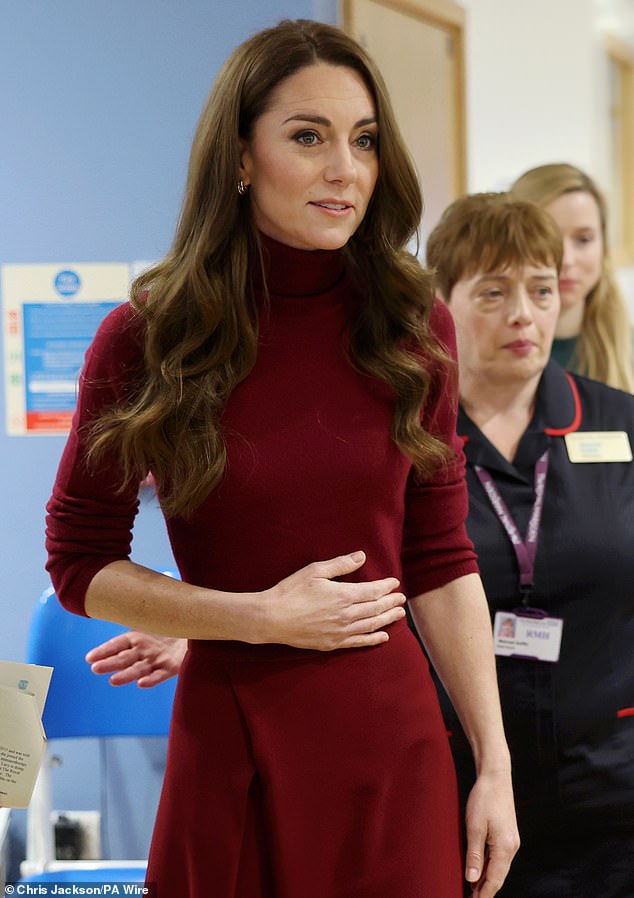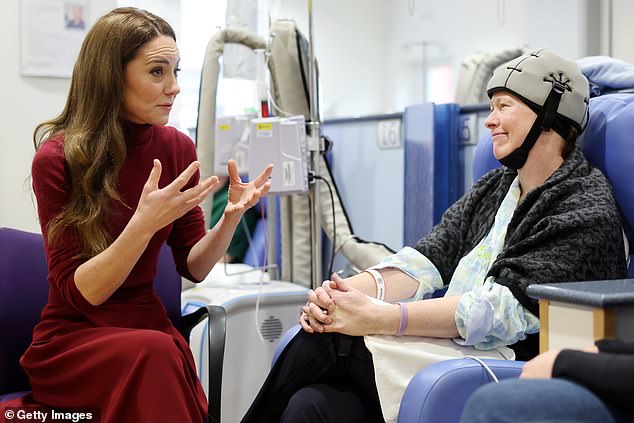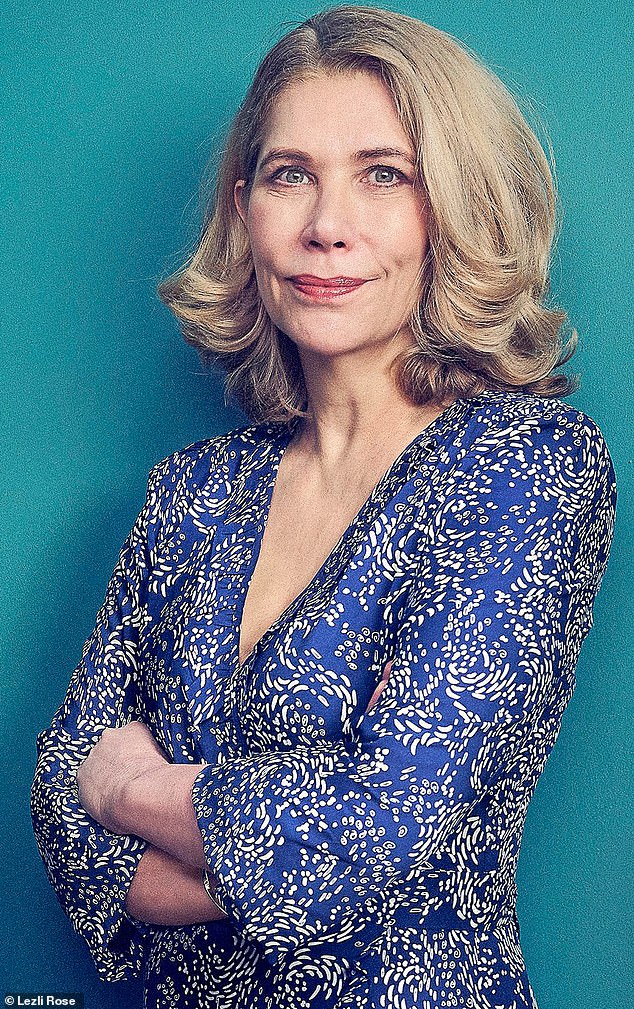With her thick, glossy hair, broad smile, confident stride and immaculate outfit, it would be easy to watch last week’s footage of the Princess of Wales returning to the Royal Marsden Hospital, where she was treated for cancer, and assume that not only was she cured, but her life had seamlessly returned to normal.
But Kate’s words painted a different picture: ‘Sometimes from the outside we all think you’ve finished treatment and you go back to things. But it’s hard to get back to normal. That’s still a real challenge.’
This statement resonated strongly with me. In my experience, the end of treatment can be almost as shocking and destabilising as the diagnosis. I’m grateful to Kate for saying this, as it is a fact that even the kindest and most sympathetic friends and family can struggle to grasp.
Research from support organisation Life After Cancer found 92 per cent of patients thought post cancer-life was more challenging than their treatment.
Like Kate, I am – touch wood – in remission. I was diagnosed in September 2021 with an aggressive form of breast cancer that had already formed two tumours and moved into the lymph nodes under my arm.
The news was, just as Kate told Royal Marsden patients, ‘really tough… it’s such a shock’. Not least because I felt exceptionally fit and well. When the lockdowns ended, I had joined a gym, toned up and was in better shape than I’d been in for years.


Good news finally came when after many rounds of chemotherapy, a double mastectomy and reconstruction, removal of lymph nodes under my right arm, 18 sessions of radiotherapy and 15 injections of targeted immunotherapy, I was told there was no evidence of cancer in my body – which is what remission means.
My lifesaving treatment was over and my surgeon, while briskly discharging me, advised, ‘Go and live your life.’
You might think I’d be euphoric, popping champagne at an ‘all-clear’ party. But that’s not how I felt at all.
From the moment of my diagnosis, I had felt as if I was being carried along on a conveyor belt. My life was shaped by appointments, scans and constant specialist care, co-ordinated across three different hospitals. Now the conveyor belt had come to an abrupt end and I simply… fell off.
My discharge from surgery happened in a corridor after what I thought was a routine appointment. I had no opportunity for a closure discussion or even to ask questions about my future.
Instead, I found myself expelled into an alien world. Of course, in reality, the world was pretty much the same, but I was not.
As Kate told fellow patients: ‘Yes, there are side effects around treatment, but actually there are more long-term side effects.’
I was left with an array of physical scars and permanent side effects, including a condition called lymphoedema, which causes my arms to swell. This is the result of having lymph nodes removed, causing lymphatic fluid (part of the body’s immune system) to gather in the limbs.
This afternoon I am heading to the chemo ward to have my final infusion of zoledronic acid, a drug to harden my bones and make them ‘more hostile’ to any circulating cancer cells that may have evaded treatment and fancy settling in a cosy bone. I also need more surgery after radiotherapy caused one of my breast implants to become hard and distorted.
But beyond these physical side effects, I carry an invisible psychological burden: mistrust of my body and the ever-present fear of cancer’s return.

This is what I believe Kate was referring to when, last September, at the end of her chemotherapy, she said she was, ‘Doing what I can to stay cancer-free is now my focus.’
The reason doctors tend to say cancer is ‘in remission’ rather than ‘cured’ is because, so far, we have no guaranteed way to ensure that people will stay cancer-free.
Even if our scans appear clear, invisible cells can sneakily travel through the body and spread to other organs. This can happen years after treatment.
Up to a third of breast cancer patients will see the disease recur, and for those people this is when the disease becomes incurable.
More advanced cancers such as mine are higher-risk and doctors have refused to give me a personal prognosis. I have found the uncertainty very difficult. Every ache or pain, even everyday tiredness or feeling run down, can spark terror.
Last year, I developed a tender spot on my scalp. I was at the hair salon, having my head massaged when I first felt it. ‘Is the pressure good for you?’ asked the hairdresser. ‘Yes, thank you. It’s great,’ I replied, while in reality feeling cold and sick with fear, convinced that I had a brain tumour that would send me mad and then kill me.
A pinched nerve in my neck had me googling at 3am for ‘symptoms of breast cancer recurrence bones neck pain’.
Studies show survivors are 27 per cent more likely to experience anxiety than the general population, and that risk rises to 50 per cent ten years or more after diagnosis.
Fear of recurrence is the number one reason why people seek psychological help after cancer. It is the great, terrifying unknown that can make us feel as though we are teetering on an abyss.
People often believe that survivors like me have regular check-ups, examinations and scans to see if we remain cancer-free. I probably assumed the same before it happened to me.
But now it makes me laugh, rather bitterly. I don’t know what it’s like for Kate – her aftercare may be more personalised and intensive – but I get a six-monthly phone call, usually from a nurse I’ve never met before who says, ‘How are you?’, to which I reply, ‘I don’t know. Possibly riddled with cancer.’ But unless I have symptoms, I won’t be offered any scans or blood tests.
I understand that studies 20 years ago showed people who had scans did no better than those who didn’t.
Even so, I find it unnerving to think that cancer may be spreading silently through my body, especially as my experience of telling the hospital about side effects is that I haven’t been believed.
When I suffered a raging post-surgical infection a consultant told me it was normal, that I was imagining the swelling and that I should stop coming to the hospital so often and go for ‘a nice picnic’ with my husband instead. A hospital physio told me that there was no swelling in my arm, and a doctor said it was ‘impossible’ for me to have it in both arms. Subsequent tests proved me correct on all counts.
And in many cases the ‘five-year all-clear’ is a myth.
It’s true that if my variety of breast cancer, called HER2-positive, recurs, it does so furiously. After three to five years, the risk diminishes sharply.
But hormone-positive breast cancers, making up over 75 per cent of diagnoses, can come back up to 30 years later. Other cancers, such as brain, bladder and ovarian are even more likely.
I know this is difficult for people who care for me to hear and understand. They naturally prefer to think of me as cured and that cancer is a thing of the past.
I sometimes feel they have forgotten I was ever diagnosed.
This is a very good thing in many ways. I want to be treated as normal, most of the time I am fine, and I don’t want to burden people with my fears.
The downside is that it can feel quite lonely and isolating.
Fortunately, I have a good friend who has also gone through cancer treatment, and we share our darkest thoughts with humour and without judgment. A text saying ‘My back hurts. Obvs planning my funeral’ won’t freak either of us out.
Fellow survivor, Rosamund Dean, is the author of Reconstruction, which deals with the physical and emotional aftermath of cancer.
She suggests noting any worrying symptom in a diary with a reminder to check it after two weeks. This gives you mental permission to put it to the back of your mind, and in most cases the swelling/pain/runny nose will improve or disappear after a fortnight. If it has got worse, that’s the cue to see a doctor.
My overwhelming feeling is Kate has shown huge courage in returning to her hospital in a blaze of publicity, her thin but beautiful face beaming.
But I feel, as the young people say, ‘triggered’ every time I set foot in a hospital. I associate them with bad news, stress and the fear of death and can be anxious, peevish and snappy rather than serene and smiling. It also makes me realise I have yet to truly process what happened.
I’m sceptical of therapy, though friends have found it hugely helpful. One sees a counsellor for free at cancer care charity Maggie’s.
My approach sounds rather a lot like Kate’s. She referred to ‘needing sunlight’, trying to keep ‘doing the things that give you joy’ and appreciating ‘all the small things in life that you take for granted’. And, like Kate, my family played a huge part here.
My husband, as the Prince of Wales did, stepped up at every level: holding my hands during appointments, running the house, making my favourite meals – and was sanguine when I preferred chocolate instead.
Whenever I needed to see the sea, especially the North Norfolk coast where Kate filmed her famous post-cancer family video, he would uncomplainingly drive for hours to fulfil my whims.
I’m sure that, like me, Kate’s first thought upon getting her diagnosis was, ‘I can’t die. My children need me.’
My two, who were 16 and 19, showed incredible resilience, though I felt guilty for telling my daughter the same week she started her A-level studies.
I spent a lot of time with them. Watching films with my son and visiting art galleries, shopping and having afternoon tea with my daughter. My stepdaughter, 29, was endlessly thoughtful and kind. It made us all closer.
After almost every chemo session, my husband and I would take our dog, Merlin, for a walk in the woods. The perfect antidote to the hospital’s sterility and artificiality.
Unlike Kate, who says she sometimes misses her port (a device stuck on to patients that delivers medication without a needle), I lived for the moments when I could detach from wires and tubes and feel like myself.
I planned treats while in the chemo chair, such as lunch with a friend or tickets to the ballet with my daughter. Mentally transporting myself into happy situations helped me forget the grimness of the present.
I was fortunate to feel well enough to exercise almost all the way through my treatment, and I remain devoted to my East Dulwich gym where yoga saved my sanity. I was proud that despite the illness, my body could still become stronger and more flexible. I liked that I could feel uncomfortable sensations in my muscles and know this was healthy instead of terrifying.
However, there’s a delicacy about Kate that speaks to the physical and mental trauma she’s not afraid to talk about.
Although she still looks beautiful and put together, I can’t imagine how she must feel on the inside, knowing that every aspect of her appearance is being scrutinised while a cancer patient.
I hated the changes cancer made to me. Some forms of chemotherapy don’t affect hair, hence Kate’s luxuriant mane, but sadly the chemo for breast cancer is the most hair-toxic ever.
I tried to save my hair using a ‘cold cap’, which cools the scalp and closes down its blood vessels. Even so, most of it fell out.
By the time my treatment ended, my eyebrows and lashes had vanished. I looked pale, haggard and spotty, with huge dark circles under my eyes.
Fortunately, I had rushed to get my brows microbladed before my first chemo, and afterwards I had hair extensions.
I didn’t do this to look gorgeous, but because I was desperate to still look like me. I hated the idea of being bald and brow-less, mainly as it would have outed me as a cancer patient. I didn’t want pity or questions from strangers.
Cancer is a horrible bully. The disease and its treatment age you profoundly at a cellular level and strip away so much of your female identity – in my case my breasts and hair.
For younger women, chemotherapy can steal fertility and push some into a crash menopause which makes it all the more important to cling to as much normality as possible.
Kate’s friends have spoken about her focus on reducing stress, which is also very important to me. As well as prioritising exercise and rest, I deliberately cultivate daily gratitude for the good things in my life, such as my warm, safe home, loving family and phenomenal friends.
Most people were wonderful in response to my cancer news, but there were a few spectacularly tactless comments. Someone who messaged me on Facebook asking, ‘what’s your prognosis?’ – essentially ‘are you doing to die, and if so, when?’ – found themselves blocked. I am also grateful to those who tolerated unreturned messages.
At her Marsden visit, Kate said: ‘The words totally disappear.’
I don’t know if this is what she meant but, for me, one of chemo’s side effects was a brain fog that left me struggling to speak.
I often couldn’t chat on the phone due to long gaps as I tried to remember words. And every evening, dozens of texts would arrive. I appreciated every one, but replying would have taken all my time and energy while what I wanted to do was forget about cancer by watching Bridgerton.
It is sometimes hard to prioritise well-being and optimism when there are bills to pay or when petty annoyances pop up. But I know when I let these things lapse, my stress levels increase and my optimism fails.
An upside of cancer is seeing how fantastic and loving my friends are and helping me pinpoint exactly what I enjoy doing most – and doing more of them.
I’m better at prioritising things I want to do and saying no to the rest. In some ways my life is better but, like Kate, I think of my post-cancer life as a work in progress.

